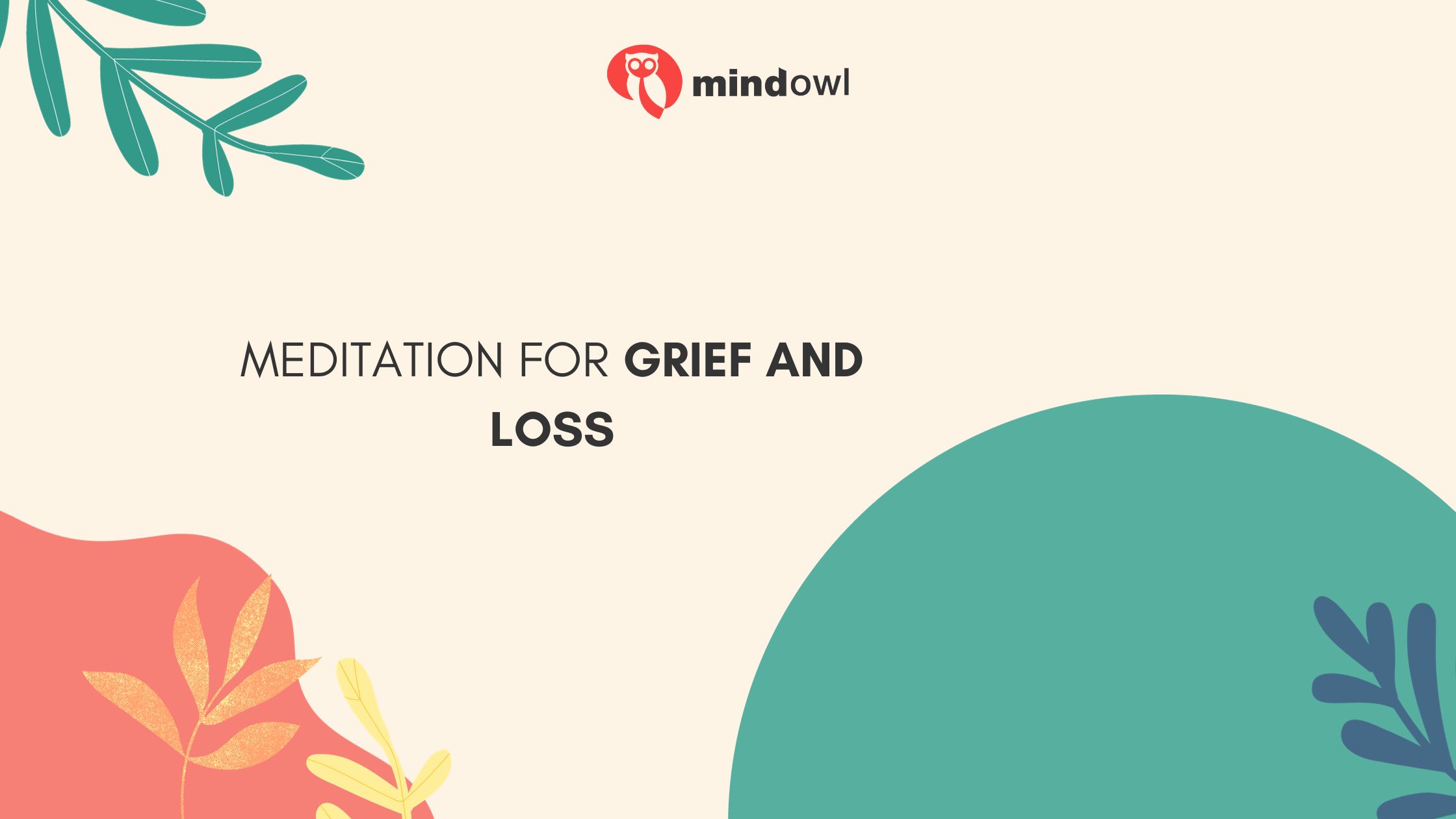 Experiencing grief and loss can feel overwhelming and disorienting. Did you know that meditation could be a beneficial tool in navigating these challenging times? Our article offers step-by-step guidance on how to use meditation to cope with grief, helping you process your emotions and find inner peace.
Experiencing grief and loss can feel overwhelming and disorienting. Did you know that meditation could be a beneficial tool in navigating these challenging times? Our article offers step-by-step guidance on how to use meditation to cope with grief, helping you process your emotions and find inner peace.
Ready to begin your journey towards healing? Let’s dive in!
Key Takeaways
- Meditation allows individuals to process and heal from grief by creating a safe space to experience and release emotions.
- Engaging in mindfulness meditation promotes a sense of calm and peace during times of loss, helping individuals navigate through difficult emotions with gentleness and compassion.
- Cultivating self-compassion through meditation supports emotional healing and well-being, allowing individuals to acknowledge their feelings without judgment.
- In order to create an ideal atmosphere for meditation on grief, find a quiet space, make it comfortable, remove distractions, and consider using tools like candles or soothing music.
Benefits of Meditation for Grief and Loss
 Meditation for grief and loss offers healing and processing of emotions, a sense of calm and peace, as well as the cultivation of self-compassion.
Meditation for grief and loss offers healing and processing of emotions, a sense of calm and peace, as well as the cultivation of self-compassion.
Healing and processing emotions
Meditation allows a safe space to experience and release emotions following a loss. It’s a process that encourages the individual to sit with their grief, not as an enemy but as an essential part of healing.
The act of meditating aids in exploring painful feelings without judgment or fear. This exploration fosters understanding and acceptance, enabling emotional wounds to begin mending.
Grief, if left unprocessed, can lead to chronic stress and deteriorating mental health; thus, processing these emotions through meditation is key for overall well-being during challenging times.
A regular practice provides room for tears or rage, disappointment or confusion – all are valid responses on the healing journey after experiencing heartache.
Providing a sense of calm and peace
Meditation for grief offers a tranquility often elusive during times of loss. This practice serves as an anchor amidst the stormy emotions that typically accompany grief. By focusing on breath and living in the present moment, meditation cultivates a feeling of calm and peace.
It acts as an antidote, providing soothing relief to a chaotic mind battered by thoughts of pain and loss.
Engaging in mindfulness practices such as meditative breathing can foster stability within this emotional tumult. Embracing these techniques may help you feel less alone in your grieving process, lessen feelings of helplessness and hopelessness, allowing space for healing to begin.
Through sustained effort, even those deep into their sorrow can find serenity in their internal world despite the external turmoil brought about by painful loss.
Cultivating self-compassion
Cultivating self-compassion through mindfulness meditation can provide a pathway to mitigate the deep pain of grief and loss. This process helps in acknowledging feelings without judgment, fostering a nurturing attitude towards oneself during challenging times.
Meditators often experience increased levels of self-compassion, leading to an overall sense of well-being and lower levels of psychological distress. Engaging in compassion meditation enhances resilience, enabling individuals to maintain presence with their emotions, thoughts, and sensations amidst turbulence.
Such practice can enhance one’s ability to navigate complex emotions associated with loss while supporting emotional healing on this journey.
Guided Meditation Practices for Grief and Loss

In this section, we will explore three different types of guided meditation practices that can be helpful for grief and loss: focus and concentration meditation, mindfulness meditation, and compassion and loving-kindness meditation.
Focus and concentration meditation
Focus and concentration meditation is a powerful practice that can be especially beneficial for individuals experiencing grief and loss. By directing your attention to a single point, such as your breath or a specific mantra, this type of meditation helps to quiet the mind and bring about a state of focused awareness.
Through regular practice, you can enhance your ability to stay present in the moment, which can be immensely helpful when navigating through the emotional challenges of grief. Additionally, focus and concentration meditation has been shown to improve memory and reduce feelings of anxiety and stress associated with grief.
It provides a valuable tool for calming the mind and finding inner peace during periods of loss.
Mindfulness meditation
Mindfulness meditation is a powerful practice that can be especially beneficial for those experiencing grief and loss. By focusing on the present moment and bringing awareness to thoughts, emotions, and sensations without judgment, mindfulness meditation helps individuals navigate through difficult emotions in a gentle and compassionate way.
It allows one to acknowledge and accept the reality of their grief while cultivating inner calmness and resilience. Through regular practice, mindfulness meditation can provide much-needed respite from overwhelming emotions associated with grief, promoting healing and inner peace during challenging times.
Compassion and loving-kindness meditation
Compassion and loving-kindness meditation are powerful practices that can be incorporated into guided meditation for grief and loss. These forms of meditation help individuals cultivate self-love, empathy, and understanding.
By directing their focus towards compassion, individuals can develop a deeper connection to themselves and others during the grieving process. Research studies have shown that incorporating compassion and loving-kindness meditation into one’s practice can positively impact the brain, reducing pain, anxiety, confusion, and stress related to grief.
These practices provide a source of comfort and support as individuals navigate through the complex emotions associated with loss.
Loving-kindness meditation also has the potential to inspire change on a larger scale. It encourages individuals to connect with others in a more empathetic way, motivating them to work towards creating a more compassionate world.
Through these practices, individuals learn not only how to approach their own grief with kindness but also how to extend that same compassion towards others who may be experiencing similar pain.
Creating an Atmosphere for Meditation on Grief
Find a quiet and comfortable space, create a supportive atmosphere, and use tools like candles or soothing music to enhance your meditation experience. Discover how creating the right environment can help you find peace amidst grief and loss.
Finding a quiet and comfortable space
In order to create an atmosphere for meditation on grief, it is crucial to find a quiet and comfortable space. This will allow you to fully focus on your practice and minimize distractions. Here are some tips to help you create the ideal environment:
- Choose a secluded area where you can have privacy and uninterrupted time for meditation.
- Find a comfortable cushion or chair that supports your body in a relaxed position.
- Make sure the room is well – ventilated and at a comfortable temperature.
- Remove any clutter or distractions from the space, such as electronic devices or noisy objects.
- Consider using soft lighting or candles to create a calming ambiance.
- If possible, connect with nature by choosing a space near a window or incorporating natural elements like plants or flowers.
Creating a supportive atmosphere
Creating a supportive atmosphere is crucial for effective meditation on grief. Here are some ways to create that atmosphere:
- Find a quiet and comfortable space where you can meditate without distractions.
- Surround yourself with comforting objects, such as candles or soothing music, to help create a calming environment.
- Consider meditating with a friend or loved one who can provide emotional support during the practice.
Using tools like candles or soothing music
Using tools like candles or soothing music can greatly enhance the atmosphere for meditation on grief and loss. These tools provide a calming and comforting environment that can help individuals process their emotions more effectively. The soft, flickering light of a candle can create a sense of peace and serenity, while soothing music can help relax the mind and ease any tension or anxiety. By incorporating these tools into your meditation practice, you can create a space that supports healing and allows for deeper introspection.
How to Practice Meditation for Grief
To practice meditation for grief, start by settling into a comfortable position and focusing on your breath or a specific mantra. Allow your emotions to arise and be present with them without judgment or resistance.
Settle into a comfortable position
Find a quiet space where you can settle into a comfortable position. Whether it’s sitting on a cushion or lying down, make sure your body is relaxed and supported. This allows you to focus your attention inward and create an environment of calmness that will enhance the healing process.
By finding physical comfort, you open yourself up to observe your feelings and thoughts without judgment, allowing them to arise naturally during your meditation practice. Settling into a comfortable position is the first step toward embracing the benefits of meditation for grief and loss.
Focus on your breath or a specific mantra
One technique for meditation for grief is to focus on the breath. By bringing your attention to the sensations of inhaling and exhaling, you can center yourself in the present moment and create a sense of calm.
Deep, slow breaths can help regulate your nervous system and bring a feeling of grounding during times of grief. Another approach is to use a specific mantra during meditation. This involves repeating a word or phrase that is meaningful and comforting to you.
The act of chanting or silently repeating this mantra can help quiet the mind and provide a focal point for your meditation practice.
Allow emotions to arise and be present with them
Meditation for grief and loss invites us to allow our emotions to surface and be acknowledged. It teaches us to sit with these emotions, rather than pushing them away or trying to suppress them.
By creating a safe space within ourselves, we can give permission for grief to arise naturally and be present with it as it unfolds. This process of allowing ourselves to truly feel the depth of our emotions is an essential part of the healing journey.
Through meditation, we learn not to judge or resist these feelings but instead hold them gently in our awareness, offering ourselves compassion and understanding during this difficult time.
In practicing meditation for grief, we discover that being present with our emotions allows us to process them in a healthy way. It gives us the opportunity to fully experience the pain and sadness without becoming overwhelmed by it.
By acknowledging and accepting our emotions as they come up, we create space for healing and growth. We begin to understand that grief is not something that needs fixing or getting rid of; rather, it is a natural response when we have experienced loss.
Conclusion: Embracing Meditation as a Tool for Healing Grief and Loss
Meditation offers a powerful tool for individuals navigating through the difficult process of grief and loss. By providing a space to process emotions, find calmness, and cultivate self-compassion, meditation can facilitate healing and promote inner peace.
With guided practices and creating a supportive atmosphere, meditation becomes an invaluable resource in honoring and navigating the journey of grief.
FAQs
Q: What is meditation for grief and loss?
A: Meditation for grief and loss is a practice that allows individuals to bring to mind and express their emotions associated with grieving. It involves using mindfulness techniques to help people move through grief and release the grief they carry.
Q: How can meditation help in the grieving process?
A: Meditation teaches individuals to be present with their emotions and allows them to feel the truth of their grief. It provides a compassionate space to acknowledge and process their feelings of loss, helping them find peace and acceptance.
Q: Can meditation help in letting go of grief?
A: Yes, meditation can be a valuable tool for letting go of grief. By allowing ourselves to sit with our grief and observe it without judgment, we create an opportunity for healing and acceptance.
Q: Can meditation help with sleep disturbances caused by grief?
A: Yes, meditation can help in improving sleep quality and reducing sleep disturbances caused by grief. It promotes relaxation and calms the mind, making it easier to fall asleep and experience restful sleep.
Q: Is meditation for grief and loss a form of therapy?
A: Meditation for grief and loss is not a substitute for therapy, but it can be a valuable adjunct therapy. It complements other forms of grief support and can enhance the overall healing process.
Q: How often should I practice meditation for grief and loss?
A: The frequency of meditation practice for grief and loss depends on individual needs and preferences. Starting with a few minutes each day and gradually increasing the duration can be a good approach to establish a regular practice.
Q: Can guided meditation for grief be helpful?
A: Yes, guided meditation for grief can be beneficial for those who prefer structured guidance during their meditation practice. It provides prompts and visualizations specifically designed to support the grieving process.
Q: What are the benefits of mindfulness practice for grief?
A: Mindfulness practice for grief helps individuals develop a sense of presence and acceptance, allowing them to navigate their grief with greater compassion and resilience. It also brings a deeper understanding of the impermanence of emotions.
Q: Is meditation for grief and loss suitable for everyone?
A: While meditation for grief and loss can be beneficial for many individuals, it may not be suitable for everyone. It is important to find an approach to meditation that resonates with your personal beliefs and needs.
Q: Can meditation help in gaining a different perspective on grief?
A: Yes, meditation allows individuals to step back and view their grief from a perspective of stillness and clarity. It can provide new insights and a more compassionate understanding of the grieving process.
MindOwl Founder – My own struggles in life have led me to this path of understanding the human condition. I graduated with a bachelor’s degree in philosophy before completing a master’s degree in psychology at Regent’s University London. I then completed a postgraduate diploma in philosophical counselling before being trained in ACT (Acceptance and commitment therapy).
I’ve spent the last eight years studying the encounter of meditative practices with modern psychology.

